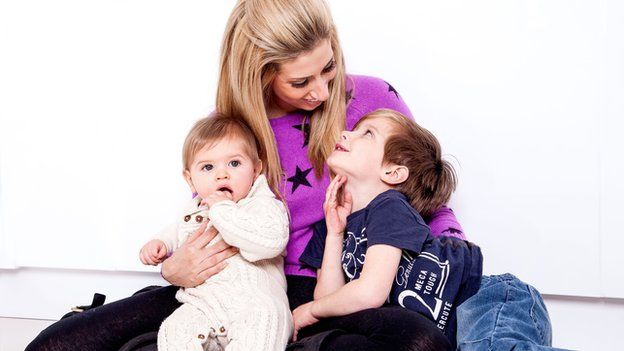Stacey Solomon: Why I thought I was the 'worst mum'
- Published

There is still a social stigma surrounding post-natal depression, with some young women afraid to speak out or ask for help says singer and TV personality Stacey Solomon, as she shares her experience of the illness.
"Everyone says that having a baby is the happiest time of your life. It wasn't like that for me. When I had my son Zach four years ago I thought my life was over."
X Factor finalist Stacey Solomon suffered from post-natal depression after giving birth to her first son at the age of 18 and is now hoping to raise awareness of the illness, particularly among young mums.
It is thought that one in 10 new mothers is affected by post-natal depression (PND), but rates among teenage mothers are higher and Solomon believes there is a greater lack of understanding and empathy in society when it comes to young mums.
"If anything happens to you after you've given birth it's just brushed under the carpet because you're a teenager and you shouldn't have done it, you shouldn't have put yourself in that position in the first place," says Solomon.
At its worse during her post-natal depression, Solomon could not stop crying and felt completely helpless.
"I remember sitting… by my mum's radiator in front of the grill where I make toast and just crying my eyes out thinking I can't make toast, how am I going to look after a baby if I can't even make toast," says Solomon.
"Now I look back and I think what an idiot, what was wrong with me, but at the time it was so sad. I just thought I'm the worst mum in the world."
Solomon felt that she could not tell anyone because of the stigma attached to the illness and the social myth that everyone should instantly fall in love and bond with their child.
Psychotherapist Dr Amanda Jones, head of North East London NHS Foundation Trust's Perinatal Parent Infant Mental Health Service treats women with PND and says it is always important to use the word "ill" so as to not minimise how serious post-natal depression can be.
"[PND includes] a feeling that the mother has or the father that they get no pleasure from their baby, which is a terrible state to be in," says Jones. "The mother will be feeling that she's a terrible mother, she can't get anything right, her baby hates her, just a sense of dark negative feelings at a time when maybe somebody had expected to feel a sense of pleasure and joy."
Nineteen-year-old Beth from Gloucestershire was bullied during her pregnancy for being a young mother and developed post-natal depression soon after giving birth to her daughter Rhianna.
"When Rhianna was two weeks old… I felt a bit down because I felt that she deserved better than me and it really has changed me, being depressed," says Beth.
"I was scared about admitting it because I was worried that social services would come in and the people in town would judge me."
Although she was diagnosed with PND, she was not offered any further help or counselling.
The most common treatments available for post-natal depression include psychotherapy, talking therapies such as cognitive behavioural therapy and medication such as antidepressants.
However, charity-run courses that bring together mothers with post-natal depression to share their experiences and encourage activities that build self-esteem and promote wellbeing, can prove beneficial. One-to-one regular visits from a nurse can also help, although Jones says the range of care that women receive can be a postcode lottery.
"I would love to say in an ideal world, across the country, that people had access to as good a screening and as good care pathways as we've got," says Jones. "But I think it's much patchier than that."
After a psychotherapy session with Jones, Beth has started her recovery process and is seeing a local NHS therapist. She is also attending a mother and baby group and has started a new job.
"My session with Amanda was really good because it made me realise that I was being silly about Rhianna not loving me," says Beth. "I've come to realise that she does need me and she loves me just as much as she loves her dad."
Solomon overcame her post-natal depression and did not suffer with PND after the birth of her second son Leighton, but although she feels like she can put this all behind her now, she still carries with her feelings of guilt.
"I don't ever want [Zach] to think that I didn't love him ever," says Solomon, "that's the last thing that I would ever want because I did, obviously I did. I just didn't feel that straight away. It was really difficult to feel that straight away, and I hope that in time that doesn't hurt him by knowing that."
Solomon says she is not embarrassed or ashamed to admit that she had depression and she wants other young women to be able to speak out more about this illness and receive the support and advice they need.
"I just feel like there's definitely got to be more help out there," says Solomon. "There's not enough groups and there's not enough support. The ones I've seen are doing an incredible job, you can see it. I just feel like that needs to be everywhere."
- Published28 February 2013
- Published31 March 2010
- Published17 August 2010
- Published19 May 2010
- Published11 November 2012